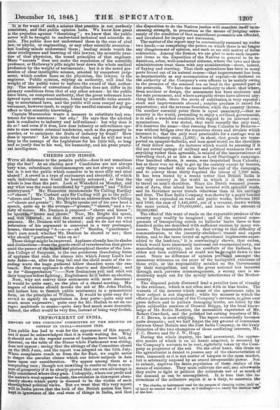CHEERS AND HISSES.
WITH all deference to the pensive public—does it not sometimes play the fool ? At an election now ? Candidates are not always very wise, subordinate electionmongers are not always exalted; but is it not the public which consents to be most silly and Most abased ? A crowd is a type of excitement and absurdity, of which each individual man would be heartily ashamed; so that 'the whole is less than the part. Look at Wakefield on Monday, and say what was the sense manifested by "gentlemen" and "fellow countrymen." Mr. Hamerton recommends Sir Culling Eardley —"cheers "; Mr. Carbutt says Sir Culling will go to the poll— "cheers and hisses " ; Mr. Bright reads an address from Sir Culling —" cheers and groans"; •Mr. Bright speaks out of his own head a speech, quite up to the average—" groans," " cheers," and a va- riety of noises. Mr. Denison is proposed—" cheers and hisses"; he speak-"hisses and cheers." Now, Mr. Bright did speak, and was reported; so that the crowd only prolonged its own penance. Mr. Denison will be elected ; and we do not-see what refutation of his argument is conveyed in a very prolonged, `hoarse, throat-tearing "A—a—a—ah ! Besides, "gentlemen" don't care much whether Mr. Denison be elected or not; then why should, "gentlemen" take on so ? These things might be improved. Applause already has its shades and distinctions—from the gentle swell of reverberation that grows amid the pauses of the baized-sncl philosophical theatre of the Lon- don College of Surgeons, to the one ponderous thundering boom of applause that ends the silence into which Jenny Lind's last note fades—as after the long lull and the shrill music of the re- ceding wave the huge gathered billow thunders upon the sea- beach. But even applause is often chaotic and discordant ; and as for " disapprobation " !—New Zealanders yell and stick out their tongues before fighting ; Englishmen do it before an election. Now, why not convey their sentiments with more decorum ? It would be quite easy, on the plan of a choral meeting. Ma- nagers of elections should invoke the aid of Mr. John Hullah, and induce him to furnish public sentiments in a symmetrical form, on the principles of Wilhem. It would be quite easy for a crowd to signify its approbation in four parts—quite easy and much more expressive ; quite easy for Mr. Hullah to set an en- raged multitude to music—quite easy and much more dramatic. Indeed, the effect would be very fine, instead of being very foolish.


























 Previous page
Previous page